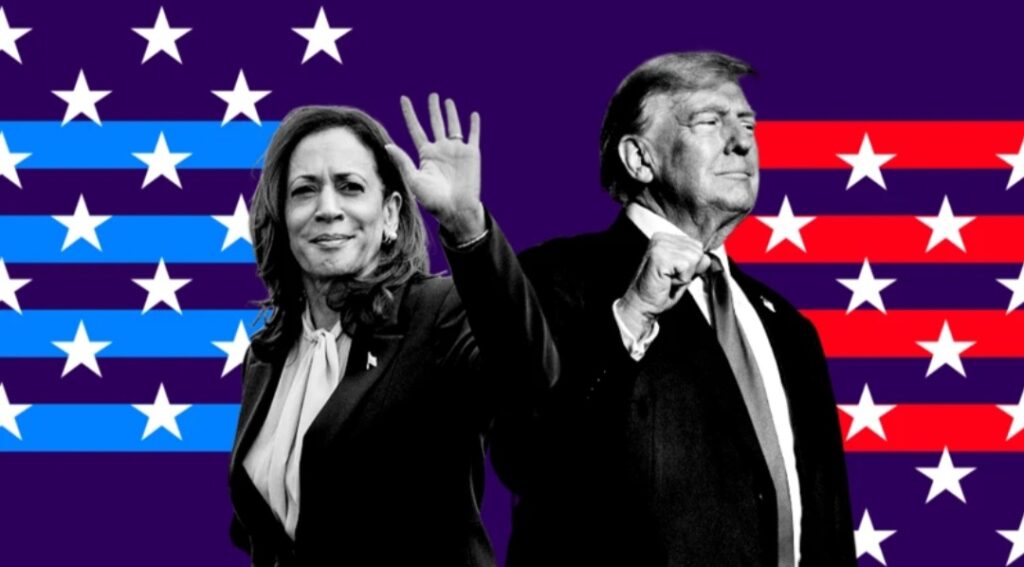By: Baadshah Chatterjee

For the first time in American history, Kamala Harris, an African-American woman on her father’s side, born in Jamaica, and Asian on her mother’s side, born in India, was chosen as the presidential candidate of the Democratic Party, one of the two major parties. She is also married to a Jew, Douglas Amhoff, and hence she represents a distinct minority. In the 2020 elections, President Joe Biden chose her to serve as his deputy mainly so that she would bring him votes from among the minority groups in American society.
Since she was chosen as a presidential candidate, Harris is running a similar election strategy and her success is also dependent on the mobilization of minorities.
Defining a minority is always a relative function against a majority. In the United States it was not always about “whites” versus “blacks”. There were a majority and a minority among the whites as well. Jews came from Europe to the United States in the first waves of immigration to it, and were considered a minority group on religious-ethnic grounds. Against the Protestant majority, the Catholics were also a religious minority, and only in 1960 was the first Catholic president, John Kennedy, elected. The most prominent minority group is that of blacks, “Afro-Americans”, who came to the United States to serve as slaves. It was a minority group based on race and color.
The involvement of Minorities in Politics
The involvement of minorities in politics is mainly related to the history of African-Americans. Historically, one can see its beginning in the American Civil War (1861-1865) which led to their release from the shackles of slavery.
The first African-American elected to the Senate was Hiram Rebels, a soldier in the Northern Army, and that was in 1870.
But he served in Congress for only one year. After him in 1875, another African-American senator, Blanche Bruce, was elected, but from 1881 to 1967, no African-Americans were elected to positions in Congress, and they continued to suffer from racism and severe discrimination, especially in the southern states.
President Abraham Lincoln who started a civil war to free black slaves was the head of the Republican Party, but in the twentieth century, this party became conservative while the Democratic Party became liberal, and were more sensitive to minority rights. That’s why most of them chose candidates on her behalf. The involvement of African-Americans in politics through the Democratic Party developed in three stages: in the 1930s and 1940s during the Presidency of Franklin Delano Roosevelt; in the fifties and sixties mainly during the period of President Lyndon Johnson and at the beginning of the twenty-first century with the election of Barack Obama, the first African-American president in the history of the United States.
Roosevelt built a broad coalition of workers, intellectuals, minorities (Jews, African-Americans, Catholics) and southerners, who were conservative, but voted Democratic, as a generational protest against Lincoln’s Republicans. Even then, the Democrats read the changing demographic map of the US and took advantage of it.


Nice and clear information
Your blog has become an indispensable resource for me. I’m always excited to see what new insights you have to offer. Thank you for consistently delivering top-notch content!
Hi i think that i saw you visited my web site thus i came to Return the favore I am attempting to find things to improve my web siteI suppose its ok to use some of your ideas
dodb buzz very informative articles or reviews at this time.
dodb buzz This is my first time pay a quick visit at here and i am really happy to read everthing at one place
Blue Techker I very delighted to find this internet site on bing, just what I was searching for as well saved to fav
Blue Techker I like the efforts you have put in this, regards for all the great content.
Thinker Pedia This is my first time pay a quick visit at here and i am really happy to read everthing at one place
Thinker Pedia I just like the helpful information you provide in your articles
Mountsinai I appreciate you sharing this blog post. Thanks Again. Cool.
Houzzmagazine I just like the helpful information you provide in your articles
Noodlemagazine Hi there to all, for the reason that I am genuinely keen of reading this website’s post to be updated on a regular basis. It carries pleasant stuff.
Your blog has helped me through some tough times and I am so grateful for your wise words and positive outlook